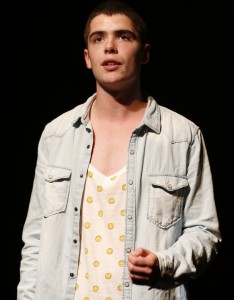The Irish are famous for their gift of gab, and Dylan Coburn Gray’s Boys and Girls, the play that opens the 1st Irish Festival at 59E59 Theatres, fits into that tradition. The “play” is more accurately a series of monologues by four actors, all of them about youthful urges for sex. A young male called A uses the Internet for porn; C, a young woman, philosophizes about the most vulgar term for a vagina; B is a virgin and laments his decent upbringing with a hapless comic spin; and D has received a declaration of love from an ex-boyfriend she still hangs out with.
But the subject matter of teenage Irish sexual mores is parochial at best. Though at times Boys and Girls echoes writers like Synge, in its portrait of the Irish lower class, and Shaw, in its hints of social commentary, it is mostly like Joyce, with its obscure, topical Dublin references and heightened language — a mixture of Joycean stream-of-consciousness, modern rap, and Irish youth slang. The speech is likely not only to confuse but to alienate listeners. It starts almost immediately and doesn’t let up, as in A’s passage about trawling for pornography on the Internet:
“A pop-up offers a top-up on my penis, quick! Hop up on the table and shazoom! Ladies won’t be able to resist your mister’s va-va-voom. They’ll jump for that Topman-chinos-lump as they spy with their admiring little eye: a gee-busting hump-snake like a lesser man’s thigh.”
To listen to the like for an hour is to have one’s patience sorely tried. One ameliorating aspect is that the actors — Ronan Carey as A, Maeve O’Mahony as B, Seán Doyle as C, and Claire O’Reilly as D — have been directed by the author to deliver the lines conversationally, and, for the most part, the percussive forced rhymes of rap are less dogged here, but they’re still eminently noticeable, and it’s often a struggle to comprehend the meaning. (To be fair, hearing the words is easier than making sense of them on the page, and the Irish accents aren’t nearly so formidable as one might expect.) The casual delivery is welcome, but rhyme, sound, and alliteration still intrude so much that they become obstacles to understanding. Anyone who has listened to a Richard Wilbur translation of Moliere’s comedies in rhymed couplets will find that Gray’s play suffers by comparison. The following passage is an example of the strain:
"And regardless. Between pills and my arduous bout of self-lovin, the hard-on’s not turned on and there’s no fire lit in the oven. Worth holding out to acquit oneself well. Some other time, fingers crossed. Or so I tell myself. Over and over as with his arm round my shoulder I clontarfwards trudge. Such is a night out.”
This kind of aural pinwheel is interesting in small doses, but it also diverts attention from substance. Gray rhymes “uncouth” with “ruth” at one point, a show-offishness that grows irritating. Does anyone ever use “ruth” in conversation? Does anyone use "surcease"? There's an uncomfortable strain toward intellectualism that also undermines the narration.
The program comes with a glossary that covers such Dublin venues as the Button Factory (“Buttoner”) and HUSSLE (a hip-hop nightclub), as well as Jedward, who are “insane, blond, Irish twins who are kind of famous because of X-factor. They have really big hair.” Although the glossary will inform you that “gee” (with a hard “g”) in the first example above is a term for “vagina,” you won’t find “clontarfwards” in it. In any case, it’s unlikely that a viewer could remember any of them as they whiz by in the monologues. The effect parallels Shaw’s comment that “America and Britain are two countries separated by a common language,” if you substitute “Ireland” for “Britain.”
Although O’Reilly’s D seemed a little off vocally, the performances all suffice, with Doyle’s vulnerable but self-aware C a particular pleasure. The set is simply four chairs on which the actors sit, and occasionally rise and change places. Yellow light bulbs, 23 in all (by designer Ilo Tarrant), hang on wires above and behind them. But with so much conveyed by language, one longs for the vocal music of an Ian McKellen or a Michael MacLiammoir. That’s impossible, given that the actors are so young, and their training has only recently begun.
Boys and Girls plays through Sept. 28, with evening performances at 7:15 p.m. Tuesday through Thursday, and on Sunday, and at 8:15 p.m. on Friday and Saturday. Matinees are Saturday at 2:15 p.m. and Sunday at 3:35 p.m. Tickets are $25, with a $15 special price on Sunday nights.



